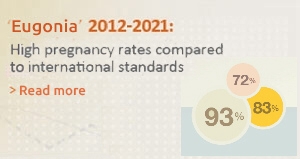Thrombophilia is an abnormality of blood coagulation that increases the risk of thrombosis (blood clots within blood vessels). It can be congenital or acquired. According to statistics, 10-20% of the population suffers from thrombophilia and may develop thromboembolic events such as stroke, myocardial infarction in deep vein thrombosis, and pulmonary embolism.
Often these thrombophilic conditions are responsible for pregnancy complications such as: first trimester miscarriages, pre-eclampsia, delayed fetal development, placental abruption and fetal death.
Common types of hereditary thrombophilia are: deficiency in proteins C and S, antithrombin deficiency, factor V Leiden mutation, prothrombin gene (G20210A) mutation and MTHFR gene mutation.






























